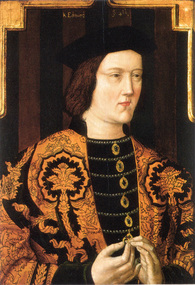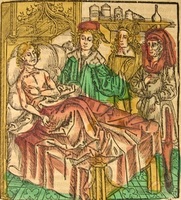stomach for this reason.........he had grown fat in the loins."
Another suggestion as to the cause of Edward's death was poison. Polydore Vergil wrote that Edward
"died of a disease utterly unknown to all the physicians which showeth some that there was some foul play, and
that may be understood to be either poison or sorcery"
as many as ye can make defensibly arrayed, there to aid and assist us against the Queen, her blood, adherents and
affinity, which have intended and do intend, to murder and utterly destroy us and our cousin, the Duke of Buckingham, and the old royal blood of this realm, and as it is now openly known, by their suble and damnable ways forecasted the same"
"our trusty and well-beloved servant, William Hobbys, cirurgion for oure body."
William Hobbes had been in the pay of Richard, Duke of York as his medicus et sirurgicus up to his untimely death at Wakefield in the December of 1460, and following that, Hobbes became a member of the household of York's heir Edward, being appointed his Sergeant Surgeon. It was in this capacity that he attended both Edward and Richard, Duke of Gloucester and following his accompanying the Duke of Gloucester to Scotland, Hobbes returned to find the king ailing.
According to this Edward's body was
"first the corps was laide upon a burdle, all naked saving he was covered from the navyll to the kneys, and
so laie x (10) or xij(12) hours" to be viewed and then " shewid to his nobles by the space of ij (2) days and more
if the weather it be suffre, when he may not goodly lenger endure, thake hym away, and bowel hym and then efstone bame (embalm) him" after which he would have been placed in a lead coffin.
Edward was later buried at St George's Chapel, Windsor Castle.
Thus ended the reign of King Edward IV, his death lit the fuse on a giant powder keg, it finally exploded on the 29th April 1483.


 RSS Feed
RSS Feed
